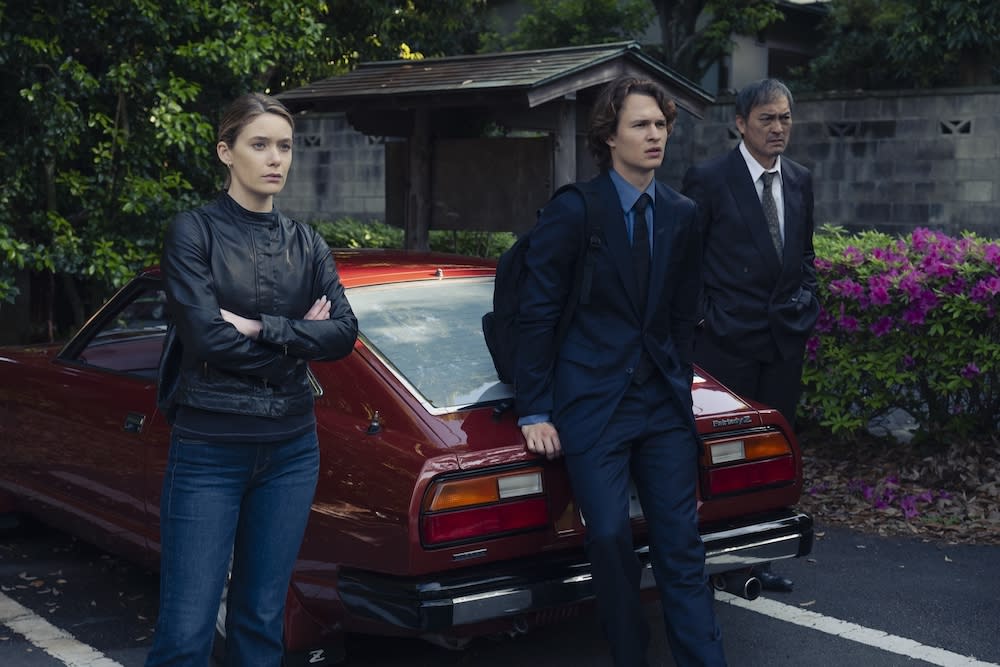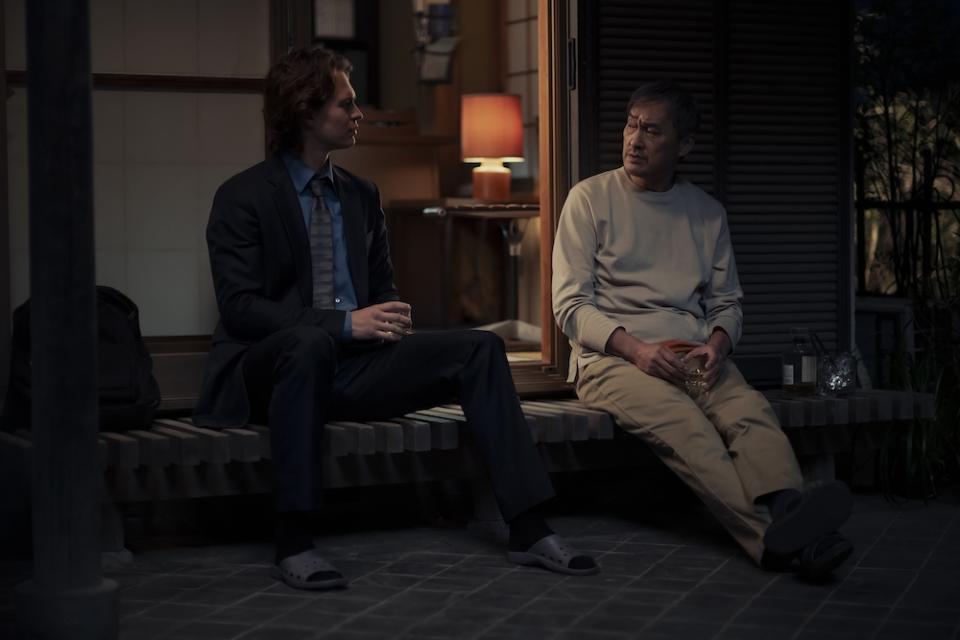‘Tokyo Vice’ Can’t Stop: The Season 2 Finale Offers a Perfect Ending — and Grounds for More

- Oops!Something went wrong.Please try again later.
[Editor’s Note: The following review contains spoilers for “Tokyo Vice” Season 2, Episode 10, “Endgame.”]
In “Tokyo Vice,” honor is a double-edged katana. On one end sits Ozaki (Bokuzō Masana), the Meicho Shimbun newspaper executive who confesses to Emi (Rinko Kikuchi) that he was the one who destroyed the Yoshino videotape — although “confesses” is too generous a word. Ozaki solves her season-long mystery without batting an eye, before mansplaining his action as if Emi is an idiot. He had to destroy the tape. If the Meicho ran a story about a government official’s involvement in the murder of a hostess, then the paper would be frozen out of government business for years. “And how would that serve our readers?” he asks. So now that Emi has brought him further evidence against prime-minister-in-waiting Jotaro Shigematsu (Hajime Inoue), proving his ties to Yakuza leader Shinzo Tozama (Ayumi Tanida), the dignified thing to do is turn over her documents to the proper parties, who will force Jotaro to resign.
More from IndieWire
“Justice will be served,” Ozaki says. To him, it doesn’t matter how Jotaro is ousted from power, so long as he’s ousted. But to Emi — and very much to the “Tokyo Vice” audience watching at home — allowing the powers that be to back-channel a solution to a problem they’ve allowed to happen isn’t the same as exposing the problem to the public.
In other words, Ozaki is working for the man, and Emi is working for the people. She sits on the other end of the katana; the end where honor isn’t an antiquated idea that preserves the established hierarchy, but an ideal worth fighting for, worth dying for. While Ozaki’s understanding of honor requires him to politely inform his fellow powerful men that they’ve been caught — so the guilty party can resign with dignity — Emi’s honor refuses to allow the truth to be trapped behind closed doors when it’s clear that meaningful change can only happen with an informed electorate.
It’s fitting, then, that the death blow dealt to Tozawa lands in four simple words: “You have no honor.” Standing behind closed doors, where a group of powerful men exact their own form of justice, Tozawa barely puts up a fight before committing seppuku — an end too honorable for the killer, yet one afforded him by the same code that he broke. At least his wife, Kazuko (Makiko Watanabe) — who told her husband it was “unwise of [him] to make an enemy of me” — gets to hand him the blade.
“There are times when the right choice is not the moral choice,” Katagiri (Ken Watanabe) says, earlier in the episode. How right he is.
Everything comes together so effortlessly in “Tokyo Vice” Season 2, and yet effort is exactly what makes it great. Showrunner J.T. Rogers and his team craft a tense, thrilling conclusion where each related yet disparate puzzle piece clicks into place at once. The reporters save the day. The cops play their part. The Yakuza finish the job. For most of the series, each of these organizations affect the other, but none are supposed to work together. The Yakuza looks down on the cops. The cops resent the Yakuza. Cops are suspicious of reporters. Reporters are suspicious of everyone. But the finale manages to pluck out our favorite people and put them on the same team. Six weeks ago, I would’ve thought it impossible to unite our series regulars around a common cause, and yet, here they are. Jake (Ansel Elgort) and Samantha (Rachel Keller), Sato (Show Kasamatsu) and Katagiri. We’ve been rooting for them individually across two seasons, and seeing them join forces (especially Sato and Katagiri) only makes the (relatively) happy ending that much more cathartic.

But is this the end? Official word on a renewal or cancellation has yet to given by Max, and the creative team remains in the dark. Rogers said, in an interview with Den of Geek, that he’d originally mapped out two seasons of story so they could “land the plane in a way that would be very satisfying to the audience. But I also have worked out and continue to work out the world going forward.” Given the recent creative programming catastrophes decisions at Max, I have little hope for “Tokyo Vice” Season 3, but that only makes me appreciate this finale all the more. Not only was Rogers smart enough and kind enough to avoid ending on a cliffhanger that may never be resolved, but he used his last scene to emphasize why this story could (and should) live on.
Perched on Katagiri’s stoop, sipping on post-dinner drinks, the retired detective and active reporter start wondering what’s next. At first, Katagiri insists he’ll be happy doing nothing and Jake is the only one between the two of them who “can’t stop.” To prove his friend wrong, Jake tries to meditate, but can’t last 10 seconds before getting up to use the bathroom. “Like you could do better?” he asks a smirking Katagiri, who, it turns out, cannot. When Katagiri’s expressionless face gives way to a smile, then a laugh, it’s clear he and Jake are one in the same. Neither is built for a quiet life, whether it’s in a tiny Tokyo backyard or an expansive Missouri farm. “All that being done with one thing means is you haven’t started the next one yet,” Jake says.
That unceasing drive, their uncompromising spirit, it’s what makes these men who they are (and makes them perfect subjects for pilot director and executive producer Michael Mann). It’s also what equips “Tokyo Vice” to tell compelling crime stories for years to come. Television is built to keep going, to relate long stories, to find fresh facets of characters that live in your home for years and years. So two men who can’t stop, even when they’re given the perfect opportunity to safely — and honorably — call it quits, these are the men who make great TV. And not just men. Not just Jake and Katagiri, but Sato (who doubles down on his adopted family), Samantha (who’s only taking a break to “recharge my batteries), and Emi, who will find a way to make it work at her ex- (and future?) boyfriend’s magazine. After all, she’s on the right side of the katana.
So what’s next? This time, the right choice and the moral choice are one and the same.
Grade: A-
“Tokyo Vice” Seasons 1-2 are available on Max. The status of Season 3 has not yet been announced.
Best of IndieWire
Sign up for Indiewire's Newsletter. For the latest news, follow us on Facebook, Twitter, and Instagram.

